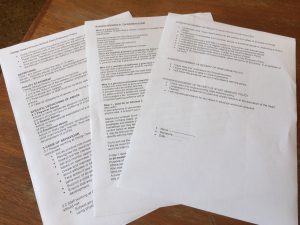
Introduction
For years, I worked in an environment where policies and protocols ruled the roost. Education Departments love their paperwork! There were many frustrating times where it seemed that the policies were more important than the pupils. I did not really get the point of it all and I was not a big fan of pointless pen pushing.
However, in Osiligi Obaya, the opposite applies and it has made me reconsider my opinions. When problems occur, everyone takes a different approach to resolve it. There has been no guidance or shared understanding about what to do. People are treated differently and it is perceived that there is nether fairness or transparency.
Policies and Protocols
The governors had identified this as a priority for change. We agreed that three policies were to be introduced: Child Protection, Staff Absence and Staff Grievance. These were the ones that caused the biggest issues. Everyone would be given a paper copy. Everyone would be expected to sign a document saying they understood and would abide by them. I was expecting a rough ride.

The challenge with the Child Protection policy was explaining that it was everyone’s job to protect children and report concerns. This goes against the Kenyan instinct to keep your head down and be selectively blind and deaf. This will avoid trouble with a colleague. There was good discussion about our individual responsibilities.
Concerns were raised about staff protection against an allegation. This is where the next key point was made. Confidentiality was crucial. All accusations must be investigated but not through gossip and rumour. Therefore, breaches in confidentiality would be treated as a disciplinary matter. The current system is for staff to have a suspicion, (founded or unfounded) and tell everyone about it. Then either don’t report it or report it to anyone they feel like. By the time an investigation is complete – the facts are almost irrelevant. There has been a trial by public opinion. Staff were able to see that a clear protocol was a protection for them as well as a guide.
Staff Absence was the next one. Clarity was needed about appropriate circumstances for paid and unpaid leave. One of the challenges is there is no budget for replacement teachers if the current teacher is still being paid. Although teachers can cover internally for a few days it is not a viable long-term approach. Staff agreed that this was reasonable. Some negotiation on other points ensued and maternity leave was increased from 3 months to 2 months. Paternity leave of 1 week was introduced for the first time. Job done.

Staff Grievance was always going to be a challenge. At the moment, staff go to whoever they think will give them the answer they want to hear! There is very muddy water in terms of whether it is the responsibility of the governors or the Head Teacher to deal with such matters. It had been agreed by governors that in almost all circumstances it should be the Head Teacher (unless the grievance concerns him directly.) Lots of robust discussion, further reminders of confidentiality and we reached consensus. Everyone now understands the policies and protocols. The challenge will be whether they abide by them!
Conclusion
It has been interesting for me to go through the process and to realise the importance of consensus and understanding about how matters should be dealt with. This will help to maintain a positive school ethos. I can’t believe I’m saying this but I have come to the conclusion that there can be considerable value in policies, protocols and paperwork!



0 Comments